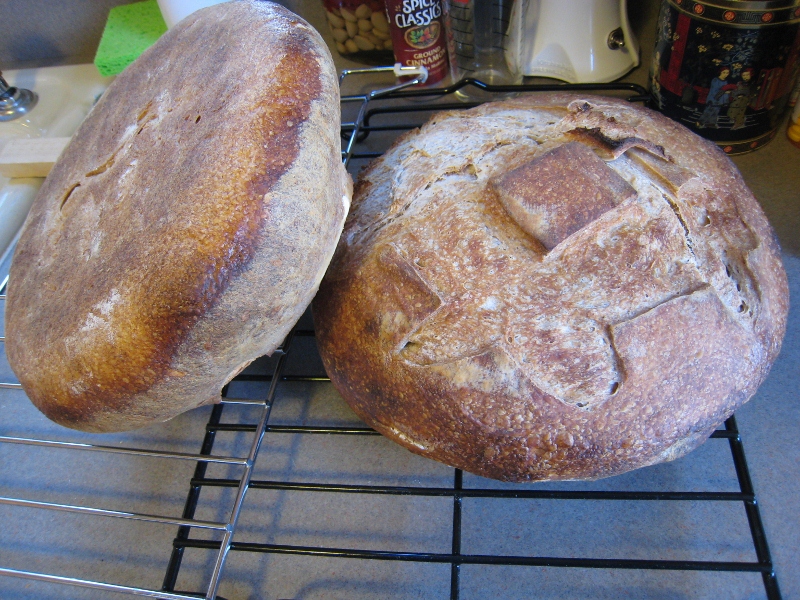
I made one large 7 pound recipe for two loaves (Hamelman's "Vermont Sourdough with Increased Whole Wheat"). Given they were 3.5 lbs each I baked one at a time. Both were retarded 13 hours in the fridge (okay, one was 12 and one was 13 hours) then placed directly on the hot stone after slashing, steam used first 12 minutes.
The first loaf used a large stainless bowl covering for the first 15 minutes of baking. When removing the bowl some of the dough stuck to the side and pulled away, but it finished nice and the tear is not too noticable. Thus my decision to bake the second loaf without the bowl - a big mistake (on the left in the first picture and in the single shot picture).
You can see how the bowl made the first loaf on the right better looking with tiny bubbles and a nice crust. The "mistake loaf" on the left and bottom has a dull looking crust in addition to a demarcation line about one inch up the side and all over the bottom which essentially matches the look and sheen of the crust from the first covered loaf. The better looking blisters and color must be from the heat of the stone which can be seen when looking at the side of the loaf. The top part of the uncovered loaf in the second picture doesn't have the nice color and tiny bubbles on the skin that the covered one has.
I expect them both to look and taste the same when they cut on Thanksgiving- but visually speaking (and poor slashing technique aside) the loaf on the right looks much better. So my take away is to stay with a covered loaf going forward.
One other thought that surprised me: the oven spring was better on these breads coming right out of the refigerator and into the oven than those of the past where I would take them out one hour to warm up at room temp while the oven was preheating. The chilled dough seems to not spread out to lower height and wider loaf by keeping the pent up energy intact until released by the heat - resulting in a higher rising loaf than otherwise.
Happy Thanksgiving all...
- Nickisafoodie's Blog
- Log in or register to post comments
For a mistake that still looks pretty good, but I do see what you mean about how nice the other loaf looks. I'll be curious if you notice the prettier one having a thinner, flakier crust too.
Happy Thanksgiving!
The dull blah crust is typical of bread baked in an oven with low humidity. It will taste good but the aesthetics are $^*#@. The bowl/cloche approach gives results that are hard to beat (or equal for that matter) in a conventional oven. If one doesn't use the cloche/bowl/Dutch oven approach steam generation is mandatory to get great crust (and even oven spring). There are several good ways on this site but...it is hard to generate and keep enough steam to give an equivalent look! Several on this site doe well (like Shao Ping and David Snyder, among others) but...it is so much easier with a cloche/bowl!
I agree with Floyd, your mistake looks pretty good!
Good Luck!
Jay
Wonderful breads, nontheless, Nick!
Crumb shots?
Thanks for the feedback. Mebake, I do not have a crumb shot as 20 people gathered over two days- and all is gone. They raved over it and flavor was very good, esp toasted. there were nice and irregular holes largest the size of a pea, but nothing like a ciabatta or other loaves that have been posted on this site. Next time I will add caraway or black charnushka seeds and officially call it rye sourdough. Best to all...